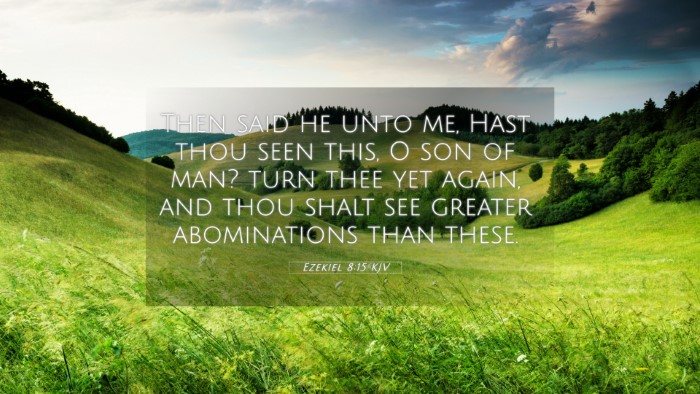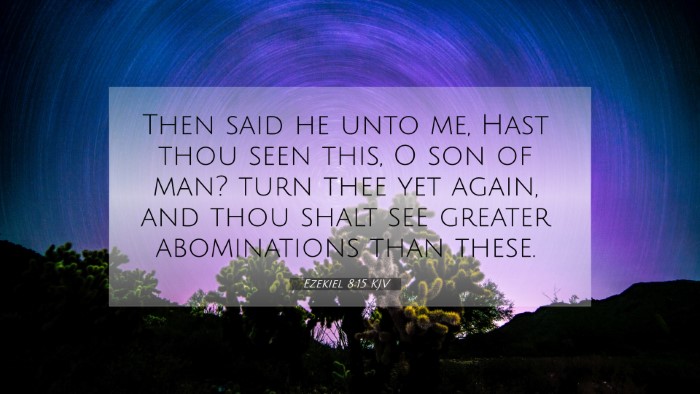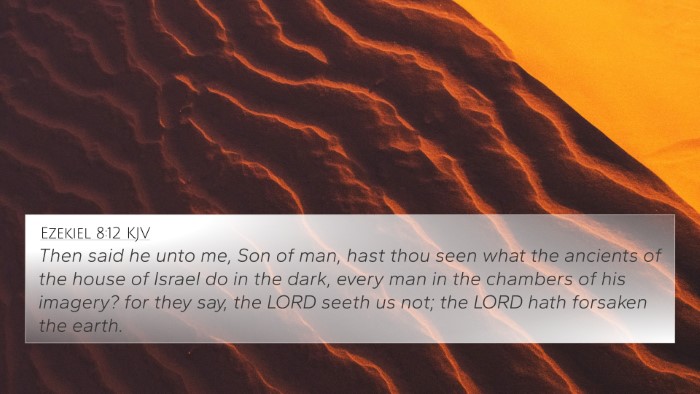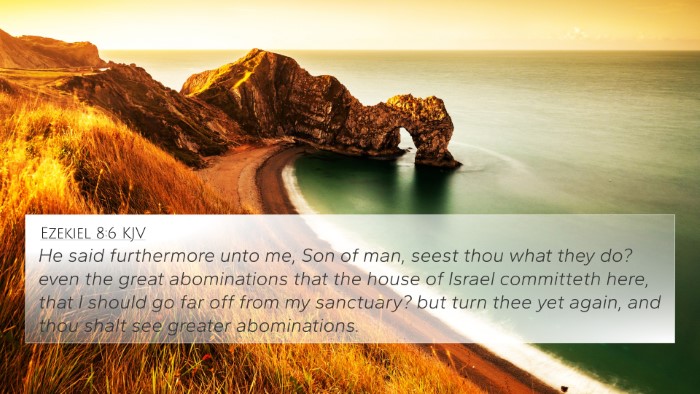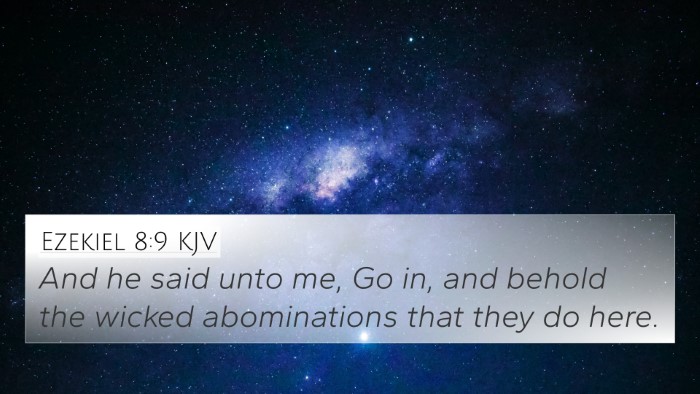Ezekiel 8:15 - Summary and Interpretation
Ezekiel 8:15 states, "Then said he unto me, Hast thou seen this, O son of man? Turn thee yet again, and thou shalt see greater abominations that they do." This verse is part of a profound and unsettling vision that the prophet Ezekiel receives, where he is shown the idolatrous practices of the people of Jerusalem. The imagery is striking and serves to illustrate the spiritual decline of Israel.
Contextual Background
The book of Ezekiel, authored by the prophet Ezekiel during the Babylonian exile, often delivers a stern message of judgment coupled with a call to repentance. Here, in chapter 8, God reveals to Ezekiel the shocking idolatry taking place within the temple—a grave offense in the sight of the Lord. This particular vision of abominations serves as a backdrop to the warnings provided throughout the prophetic texts.
Commentary Insights
Matthew Henry Commentary
Matthew Henry emphasizes the seriousness of the vision presented to Ezekiel. He points out that the phrase "greater abominations" indicates an escalation in Israel's rebellion against God. Ezekiel is depicted as a witness to the depths of corruption, highlighting God's justice and the necessity of judgment. Henry notes that this call to witness serves as a reminder of the need for vigilance against sin and the importance of adhering to God's laws.
Albert Barnes Commentary
Albert Barnes highlights the notion that God reveals these abominations to Ezekiel to demonstrate the severity of Israel’s sinfulness. He suggests that the phrase "Hast thou seen this?" serves a dual purpose, both as a rhetorical question and an invitation to understand the depths of sin. Barnes points out that the escalating nature of these abominations signifies a complete departure from the covenant that God had established with His people.
Adam Clarke Commentary
Adam Clarke elucidates the meaning of the verse by highlighting the dramatic effect of the vision on Ezekiel. He interprets the "greater abominations" as a precursor to further revelations that God will share with the prophet. Clarke also relates this vision to the broader narrative of Israel's infidelity, suggesting that these acts of rebellion lead to divine retribution ultimately expressed through the Babylonian exile.
Cross References and Thematic Connections
Ezekiel 8:15 can be linked to several significant verses that illuminate its meaning and context. Below are cross-references that further elucidate the themes present in this verse:
- Ezekiel 9:6 - Highlights the impending judgment on those who engage in idolatry.
- Jeremiah 7:30-31 - Discusses the abominations committed in Judah and their consequences.
- Isaiah 1:13-15 - Speaks of God’s rejection of hypocritical worship and empty sacrifices.
- 2 Kings 21:6 - Details the heinous practices of Manasseh, including child sacrifice.
- Ezekiel 14:6 - A call to repentance from idols and sin to restore relationship with God.
- Ezekiel 22:2-4 - Accusations against Jerusalem for bloodshed and idolatry.
- Matthew 24:15 - The reference to the Abomination of Desolation, echoing the theme of idolatry.
Conclusion
In conclusion, Ezekiel 8:15 serves as a critical point in understanding the gravity of idolatry and the need for redemption. The explicit call to turn and witness greater sins highlights God’s desire for His people to recognize the seriousness of their actions. Through the insights provided by various commentaries and the linked verses, we gain a deeper appreciation of the message that Ezekiel conveys. By examining the connections between Bible verses and employing tools for Bible cross-referencing, we can enrich our understanding and application of these profound truths in our spiritual journey.
Tools for Deepening Understanding
For those seeking to engage more deeply with the Scriptures, utilizing a Bible concordance or a cross-reference Bible study guide can greatly enhance your study experience. Here are some suggested methods:
- Identify themes within the text and link them to other relevant scriptures.
- Utilize digital resources that provide connections between texts for comparative Bible verse analysis.
- Participate in Bible study groups focused on linking biblical texts to discover inter-Biblical dialogue.
By exploring these connections, seekers of biblical truth can uncover the richness of God's Word and its application to our lives today. Understanding the interrelatedness of Scripture enables deeper faith and more robust discipleship.

